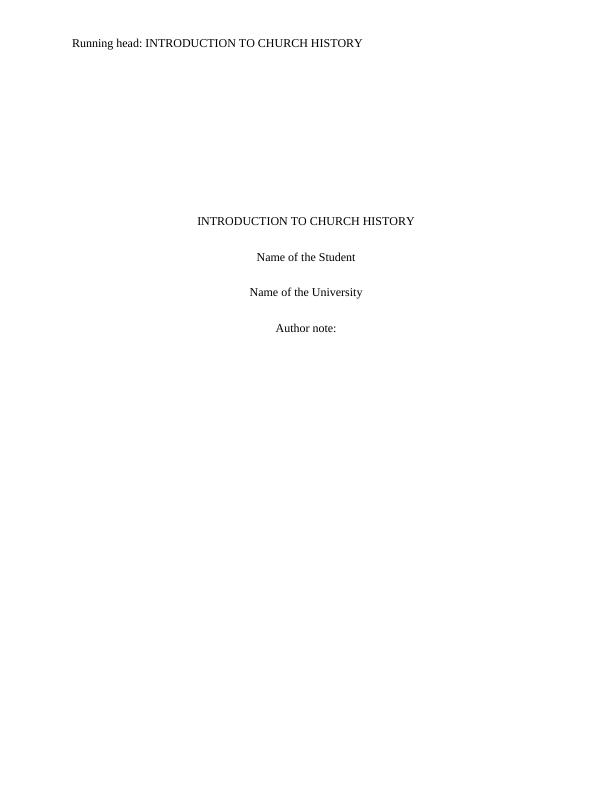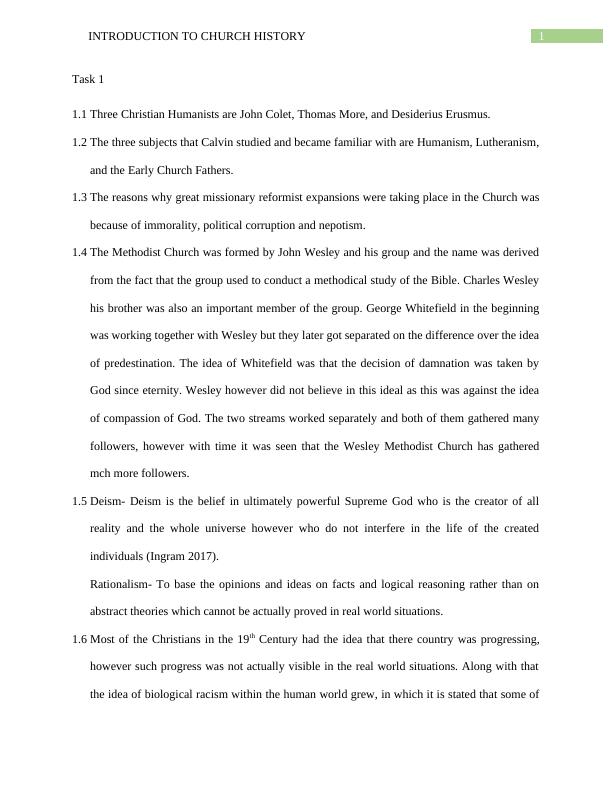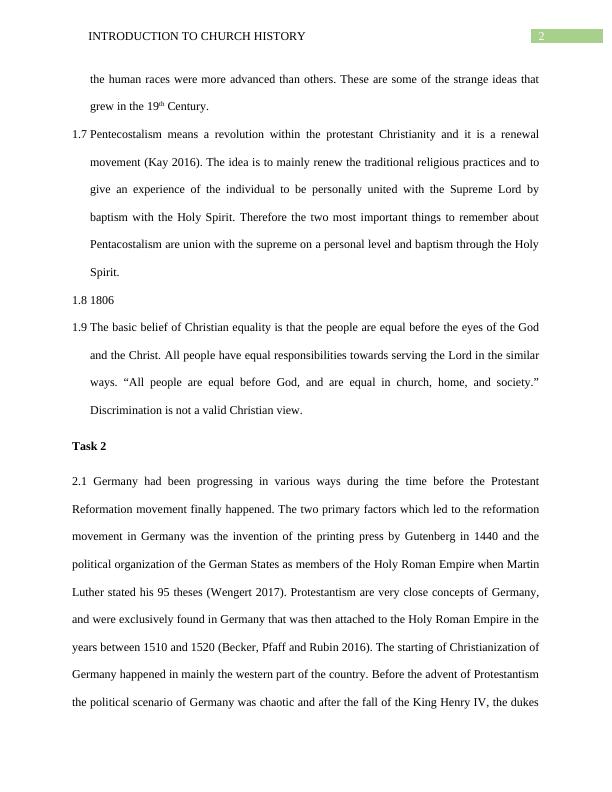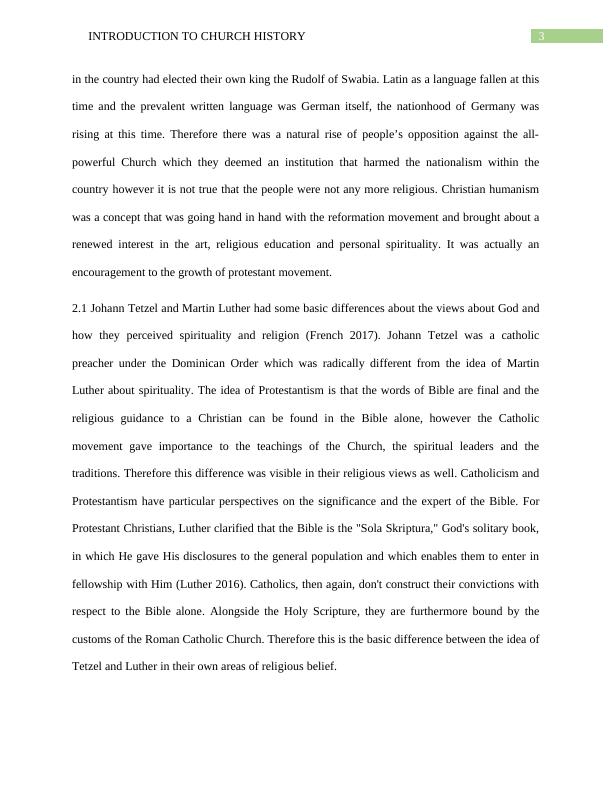Introduction to Church History: Christian Humanists, Protestantism, and More
14 Pages4164 Words450 Views
Added on 2023-06-03
About This Document
This article delves into the history of Christianity, covering topics such as Christian humanists, Protestantism, and missionary reformist expansions. It also discusses the Methodist Church, Deism, and Pentecostalism. Additionally, it explores the life of John Wesley and the concepts of established church, disestablishmentarianism, biblical criticism, and modernism.
Introduction to Church History: Christian Humanists, Protestantism, and More
Added on 2023-06-03
ShareRelated Documents
Running head: INTRODUCTION TO CHURCH HISTORY
INTRODUCTION TO CHURCH HISTORY
Name of the Student
Name of the University
Author note:
INTRODUCTION TO CHURCH HISTORY
Name of the Student
Name of the University
Author note:

1INTRODUCTION TO CHURCH HISTORY
Task 1
1.1 Three Christian Humanists are John Colet, Thomas More, and Desiderius Erusmus.
1.2 The three subjects that Calvin studied and became familiar with are Humanism, Lutheranism,
and the Early Church Fathers.
1.3 The reasons why great missionary reformist expansions were taking place in the Church was
because of immorality, political corruption and nepotism.
1.4 The Methodist Church was formed by John Wesley and his group and the name was derived
from the fact that the group used to conduct a methodical study of the Bible. Charles Wesley
his brother was also an important member of the group. George Whitefield in the beginning
was working together with Wesley but they later got separated on the difference over the idea
of predestination. The idea of Whitefield was that the decision of damnation was taken by
God since eternity. Wesley however did not believe in this ideal as this was against the idea
of compassion of God. The two streams worked separately and both of them gathered many
followers, however with time it was seen that the Wesley Methodist Church has gathered
mch more followers.
1.5 Deism- Deism is the belief in ultimately powerful Supreme God who is the creator of all
reality and the whole universe however who do not interfere in the life of the created
individuals (Ingram 2017).
Rationalism- To base the opinions and ideas on facts and logical reasoning rather than on
abstract theories which cannot be actually proved in real world situations.
1.6 Most of the Christians in the 19th Century had the idea that there country was progressing,
however such progress was not actually visible in the real world situations. Along with that
the idea of biological racism within the human world grew, in which it is stated that some of
Task 1
1.1 Three Christian Humanists are John Colet, Thomas More, and Desiderius Erusmus.
1.2 The three subjects that Calvin studied and became familiar with are Humanism, Lutheranism,
and the Early Church Fathers.
1.3 The reasons why great missionary reformist expansions were taking place in the Church was
because of immorality, political corruption and nepotism.
1.4 The Methodist Church was formed by John Wesley and his group and the name was derived
from the fact that the group used to conduct a methodical study of the Bible. Charles Wesley
his brother was also an important member of the group. George Whitefield in the beginning
was working together with Wesley but they later got separated on the difference over the idea
of predestination. The idea of Whitefield was that the decision of damnation was taken by
God since eternity. Wesley however did not believe in this ideal as this was against the idea
of compassion of God. The two streams worked separately and both of them gathered many
followers, however with time it was seen that the Wesley Methodist Church has gathered
mch more followers.
1.5 Deism- Deism is the belief in ultimately powerful Supreme God who is the creator of all
reality and the whole universe however who do not interfere in the life of the created
individuals (Ingram 2017).
Rationalism- To base the opinions and ideas on facts and logical reasoning rather than on
abstract theories which cannot be actually proved in real world situations.
1.6 Most of the Christians in the 19th Century had the idea that there country was progressing,
however such progress was not actually visible in the real world situations. Along with that
the idea of biological racism within the human world grew, in which it is stated that some of

2INTRODUCTION TO CHURCH HISTORY
the human races were more advanced than others. These are some of the strange ideas that
grew in the 19th Century.
1.7 Pentecostalism means a revolution within the protestant Christianity and it is a renewal
movement (Kay 2016). The idea is to mainly renew the traditional religious practices and to
give an experience of the individual to be personally united with the Supreme Lord by
baptism with the Holy Spirit. Therefore the two most important things to remember about
Pentacostalism are union with the supreme on a personal level and baptism through the Holy
Spirit.
1.8 1806
1.9 The basic belief of Christian equality is that the people are equal before the eyes of the God
and the Christ. All people have equal responsibilities towards serving the Lord in the similar
ways. “All people are equal before God, and are equal in church, home, and society.”
Discrimination is not a valid Christian view.
Task 2
2.1 Germany had been progressing in various ways during the time before the Protestant
Reformation movement finally happened. The two primary factors which led to the reformation
movement in Germany was the invention of the printing press by Gutenberg in 1440 and the
political organization of the German States as members of the Holy Roman Empire when Martin
Luther stated his 95 theses (Wengert 2017). Protestantism are very close concepts of Germany,
and were exclusively found in Germany that was then attached to the Holy Roman Empire in the
years between 1510 and 1520 (Becker, Pfaff and Rubin 2016). The starting of Christianization of
Germany happened in mainly the western part of the country. Before the advent of Protestantism
the political scenario of Germany was chaotic and after the fall of the King Henry IV, the dukes
the human races were more advanced than others. These are some of the strange ideas that
grew in the 19th Century.
1.7 Pentecostalism means a revolution within the protestant Christianity and it is a renewal
movement (Kay 2016). The idea is to mainly renew the traditional religious practices and to
give an experience of the individual to be personally united with the Supreme Lord by
baptism with the Holy Spirit. Therefore the two most important things to remember about
Pentacostalism are union with the supreme on a personal level and baptism through the Holy
Spirit.
1.8 1806
1.9 The basic belief of Christian equality is that the people are equal before the eyes of the God
and the Christ. All people have equal responsibilities towards serving the Lord in the similar
ways. “All people are equal before God, and are equal in church, home, and society.”
Discrimination is not a valid Christian view.
Task 2
2.1 Germany had been progressing in various ways during the time before the Protestant
Reformation movement finally happened. The two primary factors which led to the reformation
movement in Germany was the invention of the printing press by Gutenberg in 1440 and the
political organization of the German States as members of the Holy Roman Empire when Martin
Luther stated his 95 theses (Wengert 2017). Protestantism are very close concepts of Germany,
and were exclusively found in Germany that was then attached to the Holy Roman Empire in the
years between 1510 and 1520 (Becker, Pfaff and Rubin 2016). The starting of Christianization of
Germany happened in mainly the western part of the country. Before the advent of Protestantism
the political scenario of Germany was chaotic and after the fall of the King Henry IV, the dukes

3INTRODUCTION TO CHURCH HISTORY
in the country had elected their own king the Rudolf of Swabia. Latin as a language fallen at this
time and the prevalent written language was German itself, the nationhood of Germany was
rising at this time. Therefore there was a natural rise of people’s opposition against the all-
powerful Church which they deemed an institution that harmed the nationalism within the
country however it is not true that the people were not any more religious. Christian humanism
was a concept that was going hand in hand with the reformation movement and brought about a
renewed interest in the art, religious education and personal spirituality. It was actually an
encouragement to the growth of protestant movement.
2.1 Johann Tetzel and Martin Luther had some basic differences about the views about God and
how they perceived spirituality and religion (French 2017). Johann Tetzel was a catholic
preacher under the Dominican Order which was radically different from the idea of Martin
Luther about spirituality. The idea of Protestantism is that the words of Bible are final and the
religious guidance to a Christian can be found in the Bible alone, however the Catholic
movement gave importance to the teachings of the Church, the spiritual leaders and the
traditions. Therefore this difference was visible in their religious views as well. Catholicism and
Protestantism have particular perspectives on the significance and the expert of the Bible. For
Protestant Christians, Luther clarified that the Bible is the "Sola Skriptura," God's solitary book,
in which He gave His disclosures to the general population and which enables them to enter in
fellowship with Him (Luther 2016). Catholics, then again, don't construct their convictions with
respect to the Bible alone. Alongside the Holy Scripture, they are furthermore bound by the
customs of the Roman Catholic Church. Therefore this is the basic difference between the idea of
Tetzel and Luther in their own areas of religious belief.
in the country had elected their own king the Rudolf of Swabia. Latin as a language fallen at this
time and the prevalent written language was German itself, the nationhood of Germany was
rising at this time. Therefore there was a natural rise of people’s opposition against the all-
powerful Church which they deemed an institution that harmed the nationalism within the
country however it is not true that the people were not any more religious. Christian humanism
was a concept that was going hand in hand with the reformation movement and brought about a
renewed interest in the art, religious education and personal spirituality. It was actually an
encouragement to the growth of protestant movement.
2.1 Johann Tetzel and Martin Luther had some basic differences about the views about God and
how they perceived spirituality and religion (French 2017). Johann Tetzel was a catholic
preacher under the Dominican Order which was radically different from the idea of Martin
Luther about spirituality. The idea of Protestantism is that the words of Bible are final and the
religious guidance to a Christian can be found in the Bible alone, however the Catholic
movement gave importance to the teachings of the Church, the spiritual leaders and the
traditions. Therefore this difference was visible in their religious views as well. Catholicism and
Protestantism have particular perspectives on the significance and the expert of the Bible. For
Protestant Christians, Luther clarified that the Bible is the "Sola Skriptura," God's solitary book,
in which He gave His disclosures to the general population and which enables them to enter in
fellowship with Him (Luther 2016). Catholics, then again, don't construct their convictions with
respect to the Bible alone. Alongside the Holy Scripture, they are furthermore bound by the
customs of the Roman Catholic Church. Therefore this is the basic difference between the idea of
Tetzel and Luther in their own areas of religious belief.

End of preview
Want to access all the pages? Upload your documents or become a member.
